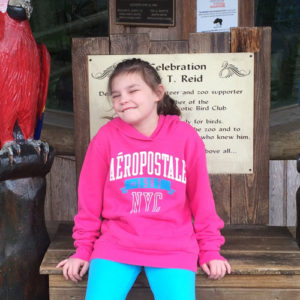Parents of Qby. girl, 11, call it ‘a miracle’ but struggled to find doctor to prescribe.
By Gordon Woodworth, Chronicle News Editor
Eleven-year-old Allison Hoffer of Queensbury suffers from Lennox-Gastaut syndrome (LGS), a type of epilepsy that causes hard-to-treat seizures and often impairs development.
Her mother Ellen says that up until a few weeks ago, Allison was non-verbal, had up to 180 seizures a day and had a three-year-old’s level of development.
But two months after starting to use medical marijuana through the New York State Compassionate Care Act, Allison’s mother says, “We found a miracle.” She says some days Allison has no seizures. Most days she has fewer than 10. “It’s nothing like it used to be,” Ellen says.
“She woke up. That’s the best way to describe it. She has started speaking. She said Mommy today. That was pretty awesome. She is making choices about what she likes and doesn’t like. She says ‘I love you’ and ‘please’ and ‘thank you.’

“…She’s more aware. She checks in with us more. She’s hugging us more. She’s getting in trouble more. She’s eating better. She sleeps better, too. Before, she never slept, so I didn’t either. But she sleeps close to regularly now.
“She’s like a totally different kid, but with her same personality. She’s an amazing little girl…and she’s more like a kid.”
The Hoffers started off with a spray, purchased from the Albany dispensary of Etain, the medical marijuana company with a grow facility in Chestertown.
They moved onto a tincture, a concentrated oil, which they say proved much easier to give to Allison.
Costs them $900 a month
“We’re up to seven bottles a month, and it’s $130 a bottle,” Ellen said. “And insurance doesn’t cover it. There’s no help at all.”
They also had difficulty finding a doctor certified to prescribe medical marijuana.
“We had been reading about it for several years, and my aunt [State Senator] Betty [Little] told us about it. We had heard good things.”
Kyle Hoffer, Ellen’s husband and Allison’s father, said, “Then we saw a special on CNN about a girl in Colorado with epilepsy who was using high CBD (cannabidiol) and was seeing great results.”
The Hoffers started trying to find a doctor who could prescribe it.
“I called our pediatrician, and he didn’t have a list,” Ellen said. “I called another pediatrician. No list. Then I called Albany Med, and they said they didn’t have any doctors there who could prescribe it.
“No name was ever given to us. It’s ridiculous. We’re just trying to keep our child safe.”
The State Department of Health sends a list of the doctors to other physicians, but won’t release it to the public.
Ellen says she found a closed group on Facebook called “New York Patients for Medical Marijuana,” which calls itself “a place to safely share and discuss our advocacy…of Medical Marijuana in the State of New York. This page is parent, patient, and caregiver oriented.”

Ellen posted on the page that she was looking for help finding a doctor who could prescribe it for her daughter.
She says, “That night, a complete stranger e-mailed me with information on Dr. Francisco Gomez, a neurologist on Wolf Road in Albany. I called him, we went to see him, and we had it within a week. The people we dealt with at the Department of Health were great. We got our ID cards and went right to the dispensary. And Etain has been great. Their pharmacist works closely with Dr. Gomez, who has been amazing.” (See separate article.)
‘It could be so much easier’
Ellen says while it’s great that they have access to medical marijuana, “it could be so much easier. The way they do it now is ridiculous…The cost to families is ridiculous.”
She says the state should notify any family whose child has a medical condition that could be helped by medical marijuana.
“And they should tell us who the doctors are that they can see. Put it on a website that you could log onto. It would be so much easier for all the parents.”
Ellen said they are considering “Charlotte’s Web,” a high-CBD hemp oil that is low in THC, so it is considered a nutritional supplement and can be ordered by mail.
“It costs $150 a month, and is out of Colorado,” Ellen said. “We’re going to try it.
“We’d prefer to stay with Etain, but we have two other kids, and we need to think about the financial aspect. The worst-case scenario? It doesn’t work and we’re back with Etain.”
GF Hospital, Hudson Headwaters: No doctors up here prescribe it now
Finding a local physician to prescribe medical marijuana is all but impossible.
“We do not currently have any providers at the hospital that are certified” to prescribe medical marijuana, said Glens Falls Hospital spokeswoman Heather Riverburg, responding to our query. “We are in the process of working with the physicians group to establish a policy.”
Dr. John Rugge, founder and CEO of Hudson Headwaters Health Network, said, “We have been looking into it. It’s pretty complicated for the physician and for the patient. The new law requires both pay a fee, and it’s available only for very limited clinical conditions, and then there are the extra burdens that come with it because federal law doesn’t allow it.”
He said that state laws allowing regulated use of medical marijuana “have the feds all tied up in knots. As a federally qualified health center, we can do it, but it would be out of the scope of our mandate, and removed from the rest of our programs. We would need special malpractice policies. It’s very complicated. And it’s limited to so few patients.
“Over time, there will be an increased awareness of the effects of medical marijuana. We will be responsive to what is kind of a cautious effort.” — Gordon Woodworth
Assemblyman Gottfried: NY treats med marijuana like it’s ‘plutonium’
Manhattan Democrat Richard Gottfried, chairman of the State Assembly Health Committee, told The Chronicle that use of medical marijuana, now legalized in New York, “is being severely and unnecessarily restricted by the state Health Department.
“The fact that the list of doctors able to prescribe medical marijuana is secret I believe is illegal and profoundly wrong…New Yorkers are entitled to that list…
“I have introduced several bills to open it up, to allow more patients to have easier access. It would still be tightly regulated, but more in line with the system we now have for other controlled substances.
“Right now it’s much more restrictive than the system for morphine or hydrocodone, and that’s just irrational and cruel to patients…The state treats it as if it were weapons-grade plutonium!”
Assemblyman Gottfried, whom The Chronicle contacted for comment, added, “The New York system makes it unnecessarily expensive to produce and very difficult for patients to afford.”
He said his bills would add several medical conditions to the treatment list, allowing more patients access to medical marijuana. It would also remove restrictions on the number of dispensaries and organizations allowed to handle it, and certify nurse practitioners and physician assistants to prescribe medical marijuana.
“They can prescribe morphine and codeine. They ought to be allowed to offer medical marijuana.” — Gordon Woodworth
Dr. Gomez: I’m treating 100 patients right now with medical marijuana
Dr. Francisco Gomez, the Albany neurologist who is treating 11-year-old Allison Hoffer of Queensbury, talked to The Chronicle Tuesday afternoon.
“I have about 100 patients I am treating with medical marijuana,” he said. “I treat patients with multiple sclerosis, epilepsy, neuropathy, Parkinson’s disease and ALS…plus I have some cancer patients because some oncologists down here refer patients to me.”
Asked if he’s surprised that medical marijuana is so effective in treating a wide range of patients, Dr. Gomez said, “I’m not surprised that it helps with pain and other symptoms. I am surprised that many patients say they feel clearer in their thinking. I did not expect that.
“Many patients also say they are more energized, as well. That surprises me.”
About New York’s medical marijuana Compassionate Care Act, Dr. Gomez said, “There is no doubt it can be made easier. It’s very limiting in terms of what patients you are allowed to treat, with a lot of onerous paperwork.
“It’s better than nothing, but I think it can be changed for the better. It’s hard to tell some patients they don’t qualify. That’s not easy.” — Gordon Woodworth
Copyright © 2016 Lone Oak Publishing Co., Inc. All Rights Reserved.
 Glens Falls Chronicle Serving the Glens Falls/Lake George region; Warren, Washington and northern Saratoga counties since 1980
Glens Falls Chronicle Serving the Glens Falls/Lake George region; Warren, Washington and northern Saratoga counties since 1980

